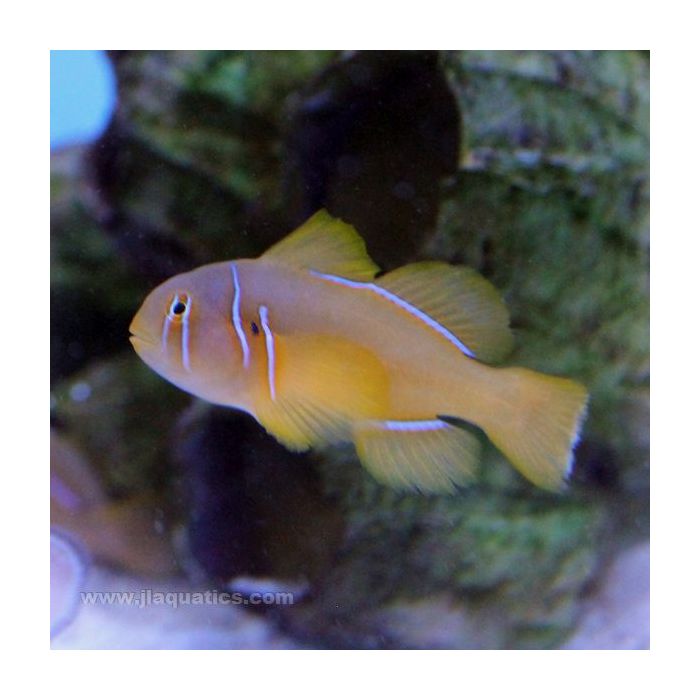Citron Clown Goby (South Pacific)
The Citron Clown goby is the largest of the clown gobies, growing up to 2 inches. Its stocky body is overall an intense mustard yellow color, and it has several blue stripes running over its face in a robin's egg blue color. A thin stripe in the same hue runs along the base of its dorsal and anal fins. It is imported occasionally from Fiji. Males and females are visually identical. We recommend an aquarium at least 5 gallons, or at least 10 gallons for a pair.
Clown gobies are entertaining little fish who spend most of their day out in the open where they may be enjoyed. They typically perch on top of rocks or coral, or even use their fins to stick to the aquarium's glass. This suction cup-like fin allows them to be comfortable even in very high-flow environments.
In the wild they make their home in the branches of SPS corals, mostly Acropora, however it is not necessary to duplicate this in the aquarium. If a pair is kept with these branching corals they may use the coral as their nest, clearing away a small area of its polyps so they may lay their adhesive eggs on the coral. This does not harm large established colonies, but may be too stressful for small or weak corals. In the aquarium a clown goby may host with any number of corals that it would not associate with in the wild, making a very interesting display. They do not hurt the coral but rather enjoy spending time within its tentacles.
Most clown gobies are scaleless, and their smooth skin is covered in a noxious mucus that gives them a foul taste. Most predators would spit them out, however caution should still be used when combining the clown goby with large-mouthed fish, as greedy predators may still swallow them.
Clown gobies are not prone to jumping from open top aquaria. They may be territorial towards other clown gobies, so we recommend they all be added together to a sufficiently large aquarium at the same time. They are typically peaceful with all other types of fish.
Clown gobies are primarily carnivores and their diet should include plenty of high quality meaty items, marine algae, Spirulina, and frozen Mysis shrimp. It is preferable to feed at least twice a day. Frozen food is best, however in time they may learn to eat dry foods.
As one of the largest families of fish there are near countless varieties of gobies which inhabit every different niche on the reef. They are coral safe and typically quite active and friendly with other fish. They have the ability to change sex to form pairs, although they don't always do so. Most gobies are imported from the Philippines.
Gobies are diminutive fish typically with elongated bodies, and as such we do not recommend any aggressive or large-mouthed fish to be kept with them; this includes all groupers, snappers, sweetlips, soapfish, lionfish, eels, goatfish, anglers/frogfish, leaf fish, etc.
















